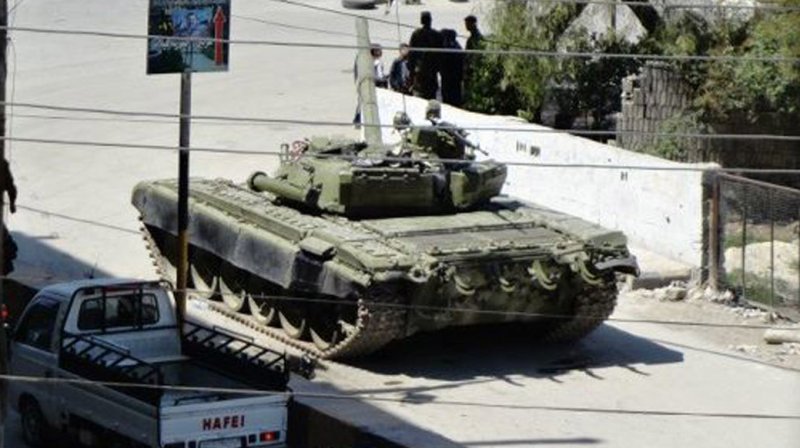A Syrian Army tank rolls down the street in Duma , a suburb of the capital Damascus, Syria April 6, 2012. UPI |
License Photo
DAMASCUS, Syria, April 16 (UPI) -- U.N. observers have arrived in Syria to monitor a tenuous cease-fire as violence persisted in parts of the country, activists said.
U.N. officials said the six unarmed observers had arrived and would be followed in the coming days by 30 more, The New York Times reported.
The number of observers is expected to expand to 250 after further negotiations with Syria.
Ahmad Fawzi, a spokesman for U.N.-Arab League special envoy Kofi Annan, said in a statement the observers "will start with setting up operating headquarters and reaching out to the Syrian government and the opposition forces so that both sides fully understand" their roles.
The U.N. Security Council unanimously approved a resolution Saturday to send the observers. China and Russia, which had voted against previous Syria resolutions, voted in favor of sending the observers.
Bashar Jaafari, Syria's U.N. ambassador, said the council decision "does not satisfy us fully" but Syria "will be on board" with the resolution.
Meanwhile, Syrian forces raided the city of Hama Monday after shelling the rebel city of Homs and attacking other towns before U.N. truce monitors started their mission.
The raid of Hama's Karm Horani neighborhood amid a "random-detention campaign," along with sniper fire that killed at least two civilians, coincided with "intense and indiscriminate gunfire" Monday by regime forces stationed at military checkpoints in the Damascus suburbs, the opposition Local Coordination Committees of Syria said in a Web posting monitored by United Press International.
The opposition Syrian Network for Human Rights said 10 people were killed in Syria Monday, including a 6-year-old child killed by sniper fire in the Damascus countryside and two soldiers executed by the Assad regime while trying to defect in Idlib, CNN reported.
The attacks, on the fifth day of a shaky cease-fire, escalated fighting that raged Sunday, with tank shells, mortar rounds and other explosive projectiles pummeling key opposition hotbeds, including war-ravaged Homs, recently under siege by the Syrian army; Idlib, previously targeted for hosting the opposition Free Syrian Army; and Daraa, where fighting was exacerbated by water-supply cutoffs by Syrian forces, opposition groups said.
"The army is shelling with mortars and tanks, and small rockets," Homs activist Waleed al-Fares told the British newspaper The Daily Telegraph by Skype. "Today we have 10 killed and 15 wounded. They broke the truce. They are doing this because there are no observers yet."
Fares said the Homs attack was a warning to residents not to talk to the U.N. truce monitors when they arrive -- in line with similar allegations made ahead of the arrival of Arab League observers in December 2011.
"They are attacking this area because there are too many activists there," Fares told the newspaper. "They are teaching people a lesson, not to go and talk when the observers arrive."
Syria said through state television its actions were defensive maneuvers against "armed terrorist groups" that broke the truce.
A commander with the opposition Free Syrian Army told The Guardian newspaper by Skype rebels intend to comply with the cease-fire but the Assad regime has not.
Qassim, a former air force officer from Rastan near Homs, said there has been heavy shooting in Homs since Thursday.
"The regime tries to provoke us, but we won't give it a pretext in front of the U.N. observers. Despite the shooting, we are holding back to prove to the world that we are an organized army and will adhere to the peaceful nature of the uprising."
He said the Assad regime "won't stop the killing because that would mean millions of people would take to the streets to protest against the government."
Differing reports and allegations could not be independently confirmed because the government has severely restricted media coverage of the conflict.
The cease-fire, which began Thursday, is part of a broader peace plan brokered by Annan last month as part of international efforts to stop 13 months of violence.
The opposition demands the resignation of President Bashar Assad and an end to nearly five decades of Baath Party rule. The U.N. estimates at least 9,000 have been killed since the protests began more than a year ago.















